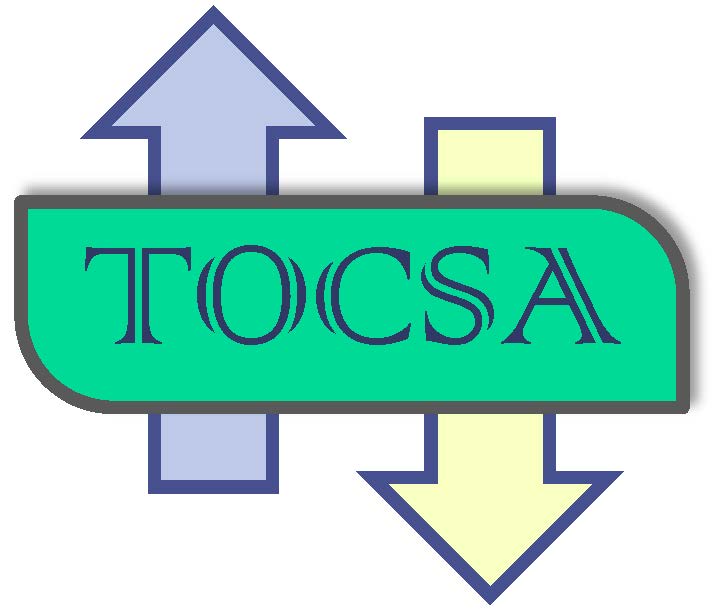Current Projects
- JCOP
- MUDL (Multidimensional Uncertainty-Aware Deep Learning Framework)


The MUDL project aims to develop a suite of deep learning (DL) techniques by considering multiple types of uncertainties caused by different root causes and employ them to maximize the effectiveness of decision-making in the presence of highly intelligent, adversarial attacks. People encounter serious hurdles in finding effective decision-making solutions to real world problems because of uncertainty from a lack of information, conflicting information, and/or unsure observations. Critical safety concerns have been consistently highlighted because how to interpret this uncertainty has not been carefully investigated. If the uncertainty is misinterpreted, this can result in unnecessary risk. Artificial intelligence (AI) researchers have actively explored how to solve various decision-making problems under uncertainty. However, no prior research has looked into how different approaches of studying uncertainty in AI can leverage each other. This project studies how to measure different causes of uncertainty and use them to solve diverse decision-making problems more effectively. The project is active during 2021-2025.
The project is managed by Prof. Jin-Hee Cho at Virginia Tech in collaboration with ARL (Army Research Labs), the University of Texas, and the University of Oslo.
MUDL is funded by NSF (the National Science Foundation).
- CyberHunt


The CyberHunt projects focuses in CTI (Cyber Threat Intelligence) by developing highly innovative cybersecurity technologies that can sense, detect, structure, exchange and analyse CTI data. In turn, this can be used for automated decision making and orchestration to disrupt and outmaneuver adversarial attacks in cyber-relevant time. The aim is to develop solutions which will radically strengthen defenses and resilience against cyberthreats targeted at critical infrastructures, including assets, systems, and networks, that are vital to the society. The project is active during 2020-2024.
The project is managed by Prof. Audun Jøsang at the Informatics Department at UiO. CyberHunt brings together complementary expertise from the partner institutions NUPI, OsloMet, mnemonic, CISCO and Edinburgh Napier University, and involves multiple PhDs, PostDocs and Master's students.
CyberHunt is funded by the IKTPLUSS program of the Norwegian Research Council (NFR).
The IKTPLUSS program is NFR's major research initiative within the ICT disciplines, with primary focus on ICT for security and health.
- Raksha
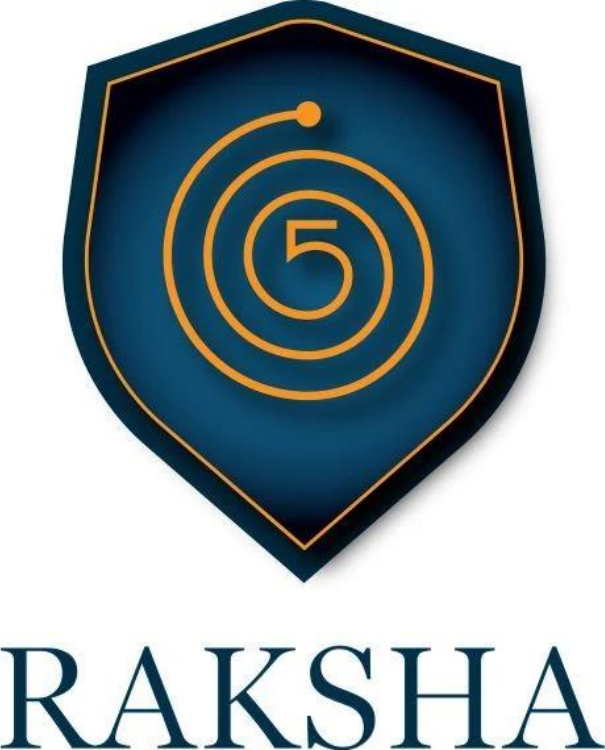

The Raksha project focuses on security for 5G and critical communication. The project is active during 2020-2024.
The project is managed by Dr. Ravi Boargaonkar at SINTEF in Trondheim. Raksha brings together complementary expertise from the partner institutions SINTEF, SimulaMet, University of South-East Norway, and the University of Oslo, and involves multiple PhDs, PostDocs and Master's students.
Raksha is funded by the IKTPLUSS program of the Norwegian Research Council (NFR).
The IKTPLUSS program is NFR's major research initiative within the ICT disciplines, with primary focus on ICT for security and health.
- CONCORDIA
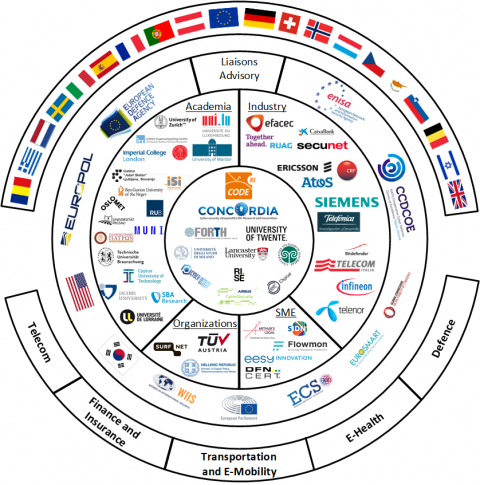


CONCORDIA is a large European cybersecurity competence network with leading research, technology, industrial and public competences. CONCORDIA provides excellence and leadership in technology, processes and services to establish an user-centric EU-integrated cyber security ecosystem for digital sovereignty in Europe.
CONCORDIA is a Europan Cyber Security Pilot with around 50 partner institutions. CONCORDIA is coordinated by the German CODE Research Institute for Cyber Security, and is active during 2019-2022. It is anticipated that CONCORDIA will be transformed into a permament European centre of excellence for cyber security competence.
CONCORDIA is funded by the European Horizon 2020 Framework Programme. Horizon 2020 is the biggest EU Research and Innovation programme ever with nearly €80 billion of funding available over 7 years (2014 to 2020).
- P4C - Partnership for Cybersecurity


The Partnership for Cybersecurity (P4C) promotes joint research and teaching through exchange of teaching staff as well as student exchange for MSc and PhD programs. The project is active during 2016 - 2020.
P4C is a collaboration between academic and research institutions in Norway (UiO and NR), Germany (TU-Darmstadt) and France (Ecole polytechnique and ENSICAEN) in the field of cybersecurity.
Oslo Analytics is funded INTPART program of the Norwegian Research Council (NFR).
INTPART focuses on establishing strong collaboration in terms of exchange and joint research initiatives between Norwegian and European/international partners.
Past Projects
- COINS


COINS (Research School of Computer and Information Security) integrates Norwegian research groups in Information Security to a larger entity, e.g. by integrating the course portfolio for research school members, building stronger relationships between doctoral students in the network, establishing more incentives to excel, and increasing student mobility through access to a larger network. The network is active during 2013 - 2018 with funding from the NFR.
- Oslo Analytics


The goal of the Oslo Analytics project at UiO is to develop solutions for cybersecurity threat detection using AI-based techniques. The project is active during 2016 - 2020.
The project is organised in collaboration with mnemonic, NR (Norwegian Computing Center), NSM (Norwegian Security Authority), FEH (Defence Intelligence College), ARL (US Army Research Labs), TU Darmstadt and Telia.
Oslo Analytics is funded by the IKTPLUSS program of the Norwegian Research Council (NFR).
The IKTPLUSS program is NFR's major research initiative within the ICT disciplines, with primary focus on ICT for security and health.
- TOCSA: Threat Ontologies for Cybersecurity Analytics
- SWAN


The goal of the SWAN project is to develop robust multimodal biometric authentication solutions. The project is active during 2016 - 2018.
The project was managed bu NTNU-Gjøvik in collaboration with UiO, Morpho (France), IDIAP (Switzerland), BDB (Germany) and Zwipe (Norway).
SWAN was funded by the IKTPLUSS program of the Norwegian Research Council (NFR).
The IKTPLUSS program is NFR's major research initiative within the ICT disciplines, with primary focus on ICT for security and health.
- ACT: Semi-Automated Cyber Threat Intelligence
- ABRI
- ConSeRNS

Concurrent Security and Robustness for Networked Systems (ConSeRNS) is funded by the Faculty of Mathematics and Natural Sciences at the University of Oslo. The purpose of ConSeRNS is to strengthen IFI's research focus on information security, e.g. by providing scholarships for PhD students working in information security. The ConSeRNS-team consists of IFI staff from the research groups PMA, ND and DESIGN. The project is active during 2014 - 2018.
Project partners: IFI and Simula.
- OffPAD
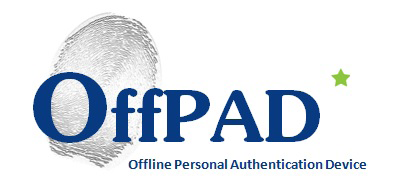
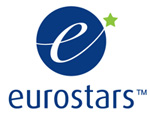
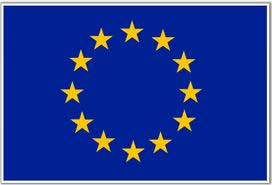

The OffPAD project focuses on developing solutions for trusted online interaction in environments of untrusted platforms. The solutions are based on using Offline Personal Authentication Devices (OffPADs). The Eurostars-fundet part of the project was active during 2013 - 2015. The project continues as an innovation project in the period 2017-2020 with VC (Venture Capital) funding, where a start-up company has already been founded.
Project partners: TazTag, ENSICAEN, University of Oslo, Vallvi and Tellu.
OffPAD is funded by the Eurostars programme with project number E!8324 OffPAD.
Eurostars is a European Joint Programme dedicated to R&D-performing SMEs, and is co-funded by the European Communities and the 33 EUREKA member countries.
- FRISC


FRISC (Forum for Research and Innovation in Security and Communications) is a network of organisations working on security in Norway. The network is active during 2012 - 2016 with funding from the NFR.
- Lucidman



Lucidman (Local User-Centric Identity Management) had as objective to investigate the security and the usability aspects for client side management of user and service provider identities. The project investigated an identity management model which can provide enhancements to security challenges associated with poor usability and scalability of managing identities on the client side. The project was active during 2011 - 2013 with funding from the Franco-Norwegian research foundation under the Eureka umbrella. The Eureka project number was 7161 LUCIDMAN.
- Web Services Trust
- NISNet


NISNet (Norwegian Information Security Network) was a network of research institutions working in information security. The network was active during 2008 - 2012 with funding from the NFR.


